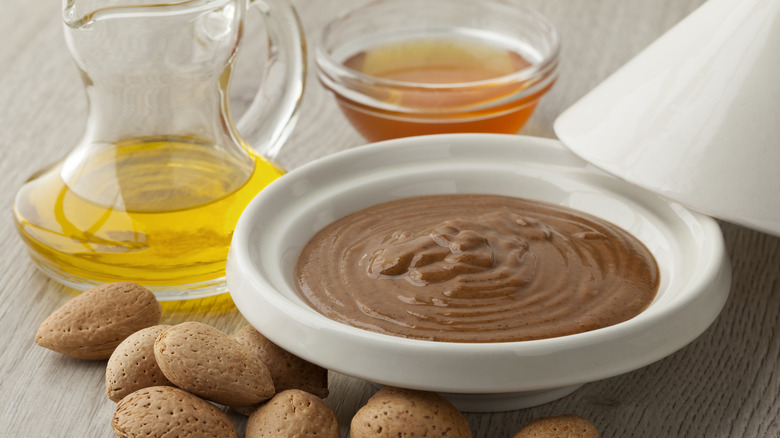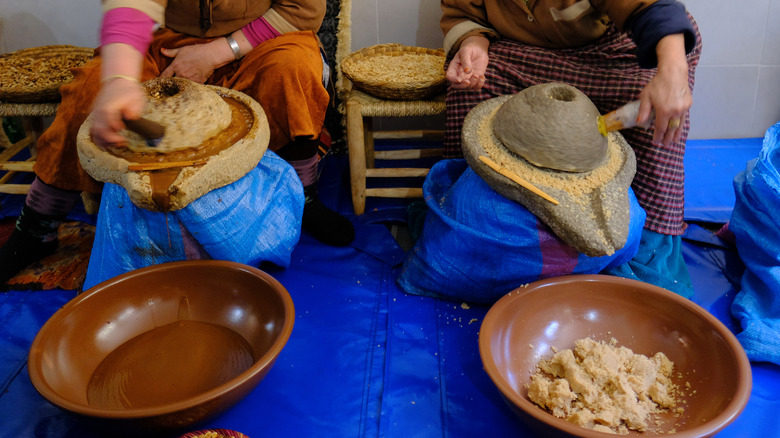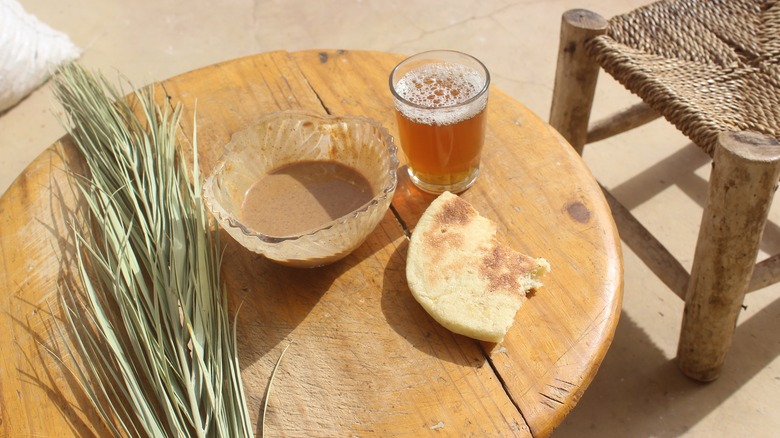Amlou: The Moroccan Nut Butter You Need To Know About
With Americans venturing away from the oh-so-treasured peanut-based spreads of their childhoods, Entrepreneur says that alternative nut butters have become all the rage. From almonds to oats and flavors like maple to hazelnut, the taste and textures of different nut butters have allowed consumers to satisfy their curiosity through new spreads and drizzles. But it isn't the only culture with a nut butter obsession. The truth is, the U.S. is pretty late to the nut butter game.
Think about it; sesame butter? While it's a great substitute for people with nut allergies, we all know it's just thick tahini — a paste derived from sesame seeds that have been used in Middle Eastern and Mediterranean cuisines since the 13th century (via Bodrum NYC). The same can be said about almond butter. Though delicious, it's really just an Americanized adaptation of Moroccan amlou, which Fondazione Slow Food describes as a rich, almond, honey, and argan oil-based spread.
The history of amlou
Amlou has been produced in Morocco since the production of argan oil (also known as Moroccan oil) began centuries ago (via Some Moroccan). According to Atlas Obscura, the reason amlou has remained exclusive to the country is because argan trees, the trees responsible for the oil that gives the spread its rich flavor, are endemic to Southwestern Morocco. Traditionally, Moroccan women made amlou in the same stone mills in which they processed the argan fruits (via My Moorish Plate), and this wasn't a simple task.
To produce just one liter of the liquid oil, women would work as many as 20 hours toasting, crushing, mixing, and extracting the oils of the argan nuts by hand, per Atlas Obscura. On top of preparing the argan nuts, the women would then go on to do the same to prepare the almonds — making the preparation of amlou even more time intensive. Given the time and effort that goes into preparing amlou, it was considered a highly prized, decadent spread that, when served to guests, is a symbol of hospitality.
Where to find it and how it's made
As mentioned, argan trees only grow in Morocco, so the only way to get your hands on authentic amlou is if it's sourced directly from Morocco. But if a trip overseas and a venture into the markets of the Sous region sounds a bit daunting, there's really only one brand that's brought amlou to American supermarket shelves: Argania Butter. While it's hard to find in person, it's certainly worth it for its use of authentic ingredients, including argan oil sourced directly from women's cooperatives in Morocco (via Specialty Foods).
Thankfully, with the development of blenders and food processors, making amlou at home is easy and much less time-consuming. Simply roast some almonds in the oven, and put them in a blender or food processor with some honey, salt, and of course, argan oil (via My Moorish Plate). While My Moroccan Food says that traditional amlou is runnier, you can adjust the ratio of ingredients to get the texture and sweetness you prefer. Really, the most difficult part is getting your hands on the argan oil, but it's truly what makes amlou so special. This is not only because of the rich and nutty flavor it adds but because of the healthy antioxidants and omega fatty acids it contains (via Nourish).
How to eat it
Once you've finally gotten your hands on some amlou, or the argan oil you need in order to make it yourself, you get to move on and enjoy the fun part: eating it. In Morocco, amlou is traditionally served for breakfast or as a snack, per Fondazione Slow Food. There, the spread is dipped and drizzled on traditional Moroccan breads such as msemen, matloa, or baghrir, along with Moroccan breakfast pastries and a fresh pot of sweet mint tea (via Atlas Obscura, Marrakesh Riad).
However, feel free to use it as you would any nut butter. Substitute amlou for almond butter in this almond butter and jelly sandwich, try it in smoothies, or drizzle it over fruit or acai bowls — amlou will make whatever else you've been using feel just plain basic. Move your other almond butters, cashew butters, hazelnut butters, and other butters out of the way because, from this moment on, you'll need room for your new favorite nut butter alternative: amlou.



